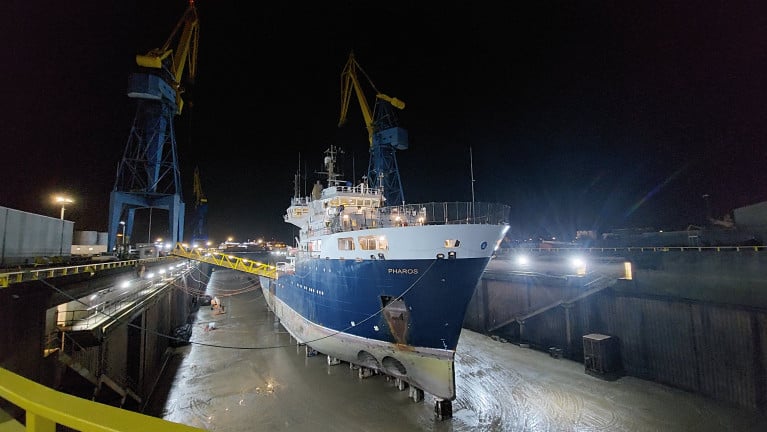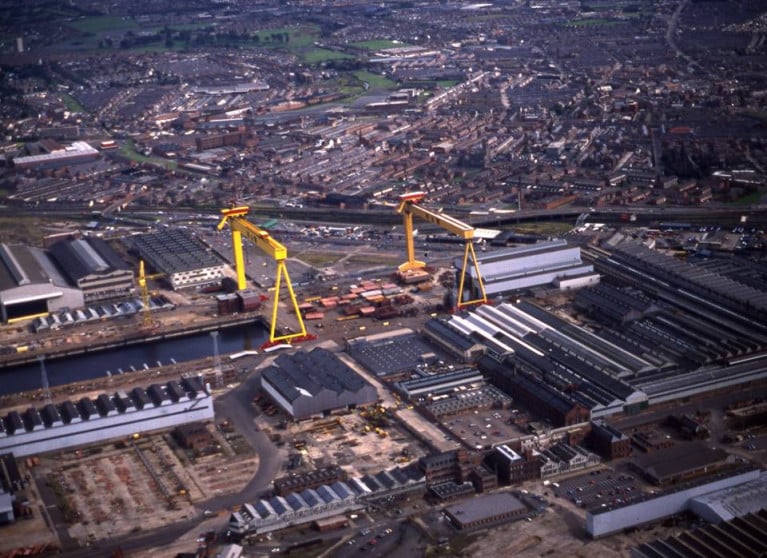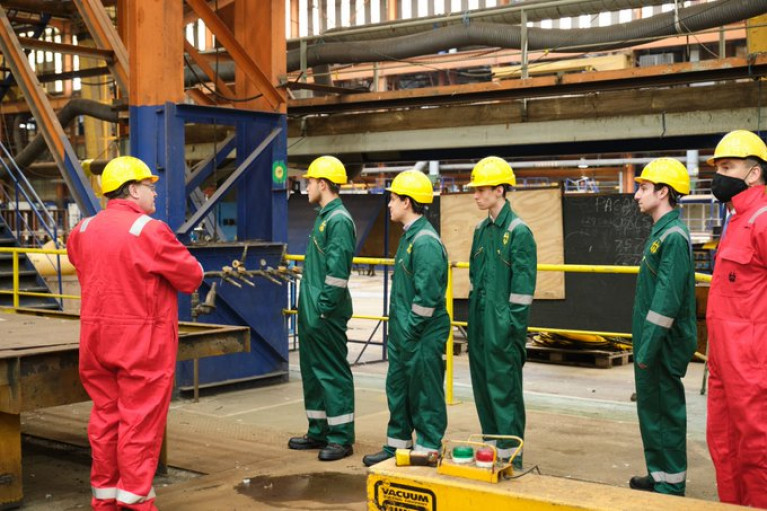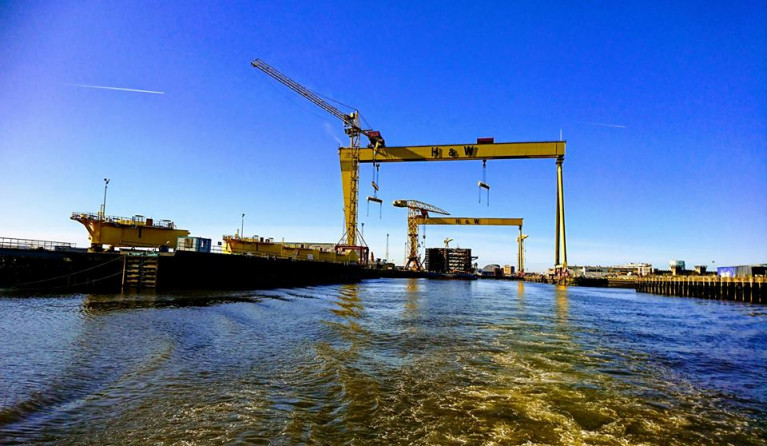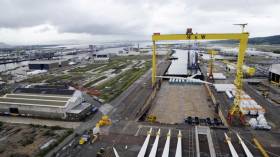Displaying items by tag: H&W Belfast
Historic Visit to Harland & Wolff as Shipyard Host Largest Cross-Party Delegation of MPs
At the iconic Belfast shipyard of Harland & Wolff, a landmark event that symbolised the restoration of devolution in Northern Ireland took place when the yard welcomed last month a cross-party delegation of MP’s.
Ben Murray, Chief of Staff and Corporate Affairs at Harland & Wolff, said it was a real pleasure to host what we believe to be the largest cross-party delegation of MPs to Northern Ireland.
The delegation, comprising members from all political spectrums, was a testament to the collaborative spirit supporting the renewed political landscape. The visit underscored the shared commitment to bolstering Northern Ireland’s economy and supporting its industrial heritage as a cornerstone for a prosperous future.
Harland & Wolff, with over 160 years of maritime and engineering excellence, stands as a beacon of industrial resilience in Belfast. The yard, once the birthplace of the RMS Titanic, has weathered the ebbs and flows of history and now represents a modern success story in a region that is itself undergoing a process of restoration and rejuvenation.
During their visit, the politicians were given an extensive tour of the facilities, witnessing the innovative work being carried out by the skilled workforce. As Afloat.ie has reported in recent months, the yard’s current projects include the manufacturing of barges for the River Thames, the refurbishment of a cruise ship, and the mid-life upgrade of an FPSO (floating production storage and offloading). The guests also saw the extensive civil works underway to upgrade and expand facilities across the Belfast site in preparation for the company’s Fleet Solid Support (FSS) sub-contract.
Representatives from the company briefed the guests on the company’s business plan and how the Belfast yard hosts work from across Harland & Wolff’s five core markets; commercial, cruise and ferry, defence, oil & gas and renewables, showcasing its adaptability and role in driving Northern Ireland’s economic growth.
The cross-party nature of the visit was highlighted as a significant step forward in the restoration of devolution. The delegation left confident in the yard’s ability to adapt and thrive. The message was clear: Northern Ireland is open for business, and its institutions are working in concert to support innovation, job creation, and economic stability.
As the political institutions in Northern Ireland continue to be restored, the yard stands as a symbol of what can be achieved through unity and a forward-looking approach. Harland & Wolff remains committed to playing a pivotal role in the region’s ongoing success story.
John Wood, CEO of Harland & Wolff said: “It is with great pride that we welcome this historic delegation to Harland & Wolff. This visit is not just about observing our advanced facilities; it’s about understanding the vital role we play in the local community. Our yard is a hub of activity, providing skilled jobs, apprenticeships, and fostering a supply chain that benefits numerous local businesses. The strong order book we have is a testament to the confidence in our capabilities and the dedication of our workforce. It ensures that we will remain a key employer in Belfast for years to come, driving forward innovation and contributing to the economic prosperity of Northern Ireland.
The restoration of political institutions in Northern Ireland comes at a crucial time as we look to the future with optimism. Harland & Wolff is more than a shipyard; it’s a symbol of Northern Ireland’s resilience and potential. We are committed to working with the Assembly and other stakeholders to ensure that we continue to be a cornerstone of the local economy, providing opportunities for growth and development.”
Hillary Benn, Shadow Secretary of State for Northern Ireland said: “I was delighted to tour the Harland and Wolff shipyard with a cross-party delegation of Parliamentary colleagues. It was great to see the yard buzzing with activity and to hear about the new jobs that are being created. The £77 million upgrade of the yard’s infrastructure is a huge vote of confidence in its future and will enable state-of-the-art shipbuilding techniques. Harland and Wolff is an icon of Belfast manufacturing and judging by what I saw it has a very bright future indeed at a time of great opportunity for the Northern Ireland economy.”
Fleur Anderson, Shadow Minister, Northern Ireland said: “It was brilliant to visit the Harland and Wolff shipyard. The shipyard is an icon of Northern Ireland’s rich industrial heritage, and it is inspiring to see how that legacy is being brought into the 21st Century. It was interesting to learn that Harland & Wolff has been rejuvenated with new defence contracts, is committed to net zero, and is employing hundreds of people. We met with apprentices and saw barges being built which are destined for the Thames, which runs through my constituency of Putney.”
Harland & Wolff Group's Belfast shipyard has joined Cruise Britain to enable it to connect and grow a world-class Centre of Excellence for Cruise in Belfast.
The Belfast shipyard is designed to expertly handle the world’s largest cruise ships within its drydocks and Northern Ireland is home to the leading interior outfitting contractors for major cruise ship conversions.
Cruise Britain is a joint initiative between British cruise ports and service providers such as ground handlers and port agents.
The organisation is focussed on raising the profile of Britain as a world-class cruise destination. Our membership-based organisation includes the network of British ports plus the service providers that combine to provide a seamless visitor experience.
Chair of Cruise Britain, Ian McQuade remarked: “We’re delighted to welcome new members to the Cruise Britain family as the association goes from strength to strength”
Formal Signing at Harland and Wolff Shipyard for £800m UK Naval Shipbuilding Subcontract
Shipyard group Harland & Wolff has formally signed a sub-contract with Navantia, the Spanish state-owned shipbuilder which is to deliver three Fleet Solid Support (FSS) naval ships to the UK’s Ministry of Defence (MOD).
Harland & Wolff said the FSS deal will generate in the region of £700-£800m in revenue for the company by the time the final Royal Fleet Auxiliary (RFA) ship is delivered. The ships will serve the requirements of the UK Royal Navy.
Up to 900 personnel will be employed at H&W's largest facility at the iconic Belfast shipyard where the peak of the seven year build programme is to take place with production due to start in 2025.
The newbuild production process it has emerged will involve a significant amount of work for the £1.6 billion contract to be carried elsewhere at sites in south-west England and southern Spain.
Each of the trio of FSS ships will be assembled from 21 separate blocks, of those seven will be built in Cadiz.
It has also been confirmed by Harland & Wolff that all three bow sections of the newbuilds will be built at H&W's Appledore facility in Devon.
The same shipyard Afloat adds (under previous owners, Babcock Marine) built modular sections for the UK Royal Navy's pair of Queen Elizabeth II air-craft carriers, with assembly taking place at their shipyard in Rosyth, Scotland.
As for the assembly of the blocks for the FSS newbuilds, this is expected to be conducted in Belfast from where the ships will be commissioned.
The Irish News has more on the shipyard group's subcontract.
Shipyards in Scotland are to construct five warships for the UK's Royal Navy following the British prime minister's confirmation of the next phase in a shipbuilding programme.
As BBC News reports, Rishi Sunak has accounced that BAE Systems two Clydeside shipyards have been awarded the £4.2bn contract to build a further five Type 26 frigates. The announcement follows an existing trio of the same class of newbuilds already under construction.
According to the Ministry of Defence (MoD) the deal would support 1,700 jobs over the next decade for the Royal Navy's 21st century frigates to be constructed at the shipyards in Glasgow where the newbuilds are to replace 12 ageing Type 23 frigates.
The BAE shipyards located in Govan and Scotstoun is where the trio of Type 26's which are designed for anti-submarine warfare and air defence, are already being built as part of an initial £3.7bn order that was announced in 2017.
At the time of that deal the MoD said five more newbuilds would be agreed in the "early 2020s".
The first of the frigates, HMS Glasgow (Afloat adds last week at Govan was transferred onto a semi-submersible barge) is to be on track later this year with delivery to the Royal Navy in the mid-2020s. The Type 26 leadship first began construction with steel-cutting in 2017.
Next to follow construction was HMS Cardiff and the third City class, HMS Belfast which as Afloat previously reported is also under construction at the Govan shipyard.
Across the North Channel, the Harland & Wolff Group (incl. its Belfast shipyard) was recently selected as part of a team bidder to construct for the MoD three crucial support ships for the Royal Fleet Auxiliary (RFA) at a cost of £1.6 bn. The support vessels are to serve the requirements of the Royal Navy.
For more coverage of the Clydeside shipyard's naval contract award can be read here.
Belfast Shipbuilding to Return As Harland & Wolff Selected As Part of Team Bidder in UK Defence Contract
Shipbuilder the Harland & Wolff Group is set to help construct three crucial support ships in a £1.6 billion contract from the UK's Ministry of Defence (MoD) with the vessels to serve the Royal Fleet Auxiliary (RFA).
As the Belfast Telegraph reports, the MoD has selected a preferred bidder with the Belfast firm that are part of Team Resolute, which includes BMT and Navantia UK.
The contract follows Harland & Wolff recent announcement that it will work with private credit manager Astra Asset Management as exclusive financing partner to support its strategic growth plans.
It is expected that the MoD contract is to create 1,200 jobs across the Group's shipyards of Belfast and Appledore (England) which will build the majority of blocks and modules while Arnish and Methil (Scotland) manufacture components. In addition 800 jobs will be generated across the UK supply chain.
A further 300 jobs in the UK will be trained at Harland & Wolff’s welding academy during the contract period which will also involve Navantia’s shipyard in Cadiz, Spain.
The newbuild trio will provide munitions, stores and provisions to the Royal Navy’s aircraft carriers, destroyers and frigates deployed at sea, subject to HM Treasury and Ministerial approval.
All three newbuilds will be finally assembled in the Group's Belfast shipyard with the 216 metre vessels, each the length of two Premier League football pitches. They will built to the Bath-based BMT and to an entirely British design.
The ships will be the second longest UK military vessels after the 284 metre Queen Elizabeth (QE) class aircraft-carriers which involved modular parts completed at Appledore, the north Devon shipyard which was then under different ownership until the Group's acquisition in 2020.
The last vessel built by the shipyard in Queens Island, east Belfast was the ro-ro freighter Anvil Point which was launched in 2003. A fleetmate of the 'Point' class series, Afloat reported made a call to Dublin Port almost a decade ago.
To read more on this significant shipbuilding contract as part of the UK's National Shipping Strategy, click here.
Northern Lighthouse Board's Aids to Navigation Tender Dry-Docks for 'Special Survey' at H&W Belfast Shipyard
Northern Lighthouse Board’s aids to navigation vessel NLV Pharos which operates in Scottish waters, is currently at Harland & Wolff's Belfast shipyard for a scheduled dry-docking which happens twice in a 5 year-period, writes Jehan Ashmore.
Commenting to Afloat, Mike Bullock, Chief Executive of the Northern Lighthouse Board said "this is NLV Pharos’ year 15 ‘Special Survey’ which means the ship is receiving a class survey and recertification. The maintenance work includes complete overhaul and bearing change of the main azimuth propulsion units and tunnel thrusters, crane overhaul and preservation and painting of the hull".
Pharos' primary role is to respond to wrecks and new navigational dangers, as the vessel supports the maintenance and refurbishment of NLB’s 200 plus lighthouses as well as conducting buoy operations.
To assist operations, Pharos is equipped with a helicopter pad, dynamic positioning (DP), a 30 tonne crane and a hydrographic survey suite.
The 2007 built NLV Pharos is homeported in Oban, west Scotland from where the vessel along with the smaller NLV Pole Star (see replacement story) works from this base in addition to serving in Isle of Man waters.
Technical operations are also carried out at Oban which provides maintenance workshops and facilities for the construction of buoys and beacons.
In addition to the Oban base, technicians are located in Inverness, Orkney and Shetland. As for the headquarters of NLB, they are located in Edinburgh with a staff of 80 personnel.
The NLB is one of three General Lighthouse Authorities (GLA's) as Trinity House is the authority for waters off England, Wales and Gibraltar. Whereas the Commissioners of Irish Lights is responsible for all waters off the coast of Ireland.
The famous Harland and Wolff shipyard cranes of Samson and Goliath in Belfast were insured for £9 million in 1976 — the equivalent of £60 million today.
A company memo in February that year revealed the insurance policy, at an annual premium of £56,000, had been taken out as a condition of a Shipbuilding Industry Board loan.
But in the letter from Douglas Cooper, the Assistant Managing Director, to the Department of Commerce, he said they intended to cancel it after the loan terms had been scrapped.
For more the Sunday Life reports.
Harland & Wolff has announced that it will soon be launching a new apprenticeship scheme at the 160 year old historic shipyard that last year notably signed a letter of intent to build ships again.
The scheme is set to officially launch later this year across both the flagship Belfast and the newly acquired Appledore sites, as Afloat reported. The Devon shipyard had up to 2018 built OPV's for the Naval Service.
Apprenticeships offered will be across three distinct functions, Trade, (welders, pipefitters, electricians, riggers, fabricators, etc) Technical, (engineers, naval architecture) and Business Support (sales, administration).
Highlights of the unique training programme will include practical on-the-job training, one to one mentoring alongside its experienced workforce, shipyard training facilities and the opportunity to earn while you learn.
As part of the scheme, apprentices will have the chance to experience working across Harland & Wolff’s five key sectors; cruise & ferries, defence, oil & gas, commercial and renewables, as well as across the full lifecycle of services it offers; technical services, building and fabrication, repair and maintenance, in service support, conversion, and decommissioning.
Prospective apprentices will be able to register their interest on the Harland & Wolff website here.
Harland & Wolff would also like to hear from any relevant apprentices who have been unable to complete their apprenticeship through the recent loss of employment.
InfraStrata the energy firm has asked for an extension from Harland and Wolff administrators to pay the final instalment for its purchase of the Belfast shipyard - due last Thursday - blaming the coronavirus pandemic.
The company still has £1.45m outstanding from the £5.25m deal which rescued the iconic company from closure.
However, it did not make yesterday's payment, saying it had been affected by the pandemic and worldwide lockdown restrictions.
"Given the current Covid-19 situation, the company has formally requested the administrators for an extension period in order to pay the final amount of the consideration," it said.
"Positive discussions are continuing with the administrators to determine an optimum time frame for the company to complete this final tranche of payment. The company will make an announcement as soon as an agreement has been reached."
More on this story from the Irish News here
Shipbuilding: Harland and Wolff Says It Needs More Support
#BelfastLough - UK government should show greater support for shipbuilding firms after Brexit, according to the chief executive of Harland and Wolff.
As BBC News reports, Brexit offers opportunities, but the industry still needs government support, said Jonathan Guest.
A previous review recommended future naval ships should be built at UK yards, including Belfast.
Harland and Wolff hopes to be a part of a government plan to build five new Royal Navy frigates across the UK.
The new frigates would be built across different shipyards, but assembled at a central site, and ready for service by 2023.
For more on the shipyard, click here.


























